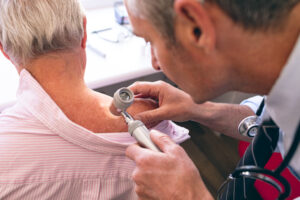Veterans often face a myriad of health challenges, some of which may be service-connected, leading to disability claims. One such condition that is gaining attention is obstructive sleep apnea (OSA), and its potential connection to neck pain or cervical pathology. Leah will explore the relationship between obstructive sleep apnea and neck pain in veterans disability claims, shedding light on relevant literature and potential avenues for support.

Understanding Obstructive Sleep Apnea
Before delving into the connection between Obstructive Sleep Apnea and neck pain, it’s crucial to understand what obstructive sleep apnea is. OSA occurs when the upper airway collapses, often due to mechanical stress or excess body tissue, hindering the normal flow of air during sleep. This can result in symptoms such as loud snoring, disrupted sleep patterns, and daytime fatigue.
Service Connection for OSA
Veterans can establish a service connection for OSA in various ways, including a primary diagnosis during service in some cases, documented symptoms or evidence during service, and buddy statements attesting to witnessed apneic events. Additionally, veterans may seek secondary service connection, linking Obstructive Sleep Apnea to other service-connected disabilities like PTSD, mental health conditions, or orthopedic issues leading to weight gain.
OSA and Neck Pain: A Common Association
A frequently encountered correlation is obstructive sleep apnea and neck pain. The link between these two conditions has been explored in medical literature, providing valuable insights for veterans seeking disability claims related to both OSA and neck issues.
Relevant Literature
1. Sleep Apnea and Cervical Spine Pathology (2014)
In 2014, the European Spine Journal published an article titled “Sleep Apnea and Cervical Spine Pathology,” highlighting the multifactorial nature of sleep apnea. The study discussed how pathologies of the cervical spine, including osteochondromas and osteophytes, can contribute to sleep apnea symptoms. Biomechanical forces leading to the collapse of the upper airway were explored, emphasizing the importance of understanding cervical spine health in OSA cases.
2. Alteration in Cervical Spine Mechanics (2015)
The Egyptian Journal of Chest Diseases and Tuberculosis in 2015 published “Alteration in Cervical Spine Mechanics and Obstructive Sleep Apnea Syndrome Patients.” This study delved into the mechanics of the cervical spine in patients with OSA, providing additional evidence of the connection between cervical spine issues and sleep apnea.
3. Obstructive Sleep Apnea, Cervical Osteophytosis, and Sudden Death (2016)
In 2016, the Journal of Sleep and Sleep Disorder Research featured an article titled “Obstructive Sleep Apnea, Cervical Osteophytosis, and Sudden Death: A Paradynamic Case and Brief Overview of the Literature.” This case study emphasized the potential severity of the connection, illustrating a paradigmatic case of sudden death associated with OSA and cervical osteophytosis.
4. Cervical Spine Hyperextension and Altered Postural Respiratory Coupling (2020)
“Cervical Spine Hyperextension and Altered Postural Respiratory Coupling in Patients with Obstructive Sleep Apnea” was published in Frontiers in Medicine in 2020. This study explored the impact of cervical spine hyperextension on respiratory coupling, providing additional insights into the biomechanics of OSA.
5. Head Posture and Upper Cervical Spine Morphology (2017)
A book titled “Sleep Apnea Recent Updates” published in 2017 included a chapter on “Head Posture and Upper Cervical Spine Morphology in Patients with Obstructive Sleep Apnea.” This source delved into the relationship between head posture, cervical spine morphology, and obstructive sleep apnea.
Presenting Literature to Treating Doctors
Armed with this literature, veterans can present these findings to their treating doctors and potentially request an expert medical opinion if the relationship applies to their circumstances. Highlighting relevant passages from these articles and discussing how the literature supports the connection between OSA and neck conditions can be beneficial in obtaining medical opinions in favor of the veteran’s case.
Disability Ratings for OSA
Understanding the disability ratings for OSA is crucial for veterans navigating the claims process. Currently, Obstructive Sleep Apnea is generally rated at 50%, with variations based on the severity of symptoms and the need for devices like CPAP machines. Veterans should stay informed about any potential changes in disability ratings, as these may impact their claims.
- 50%: Requires a CPAP machine or a similar device.
- 30%: Hypersomnolence or daytime sleepiness without requiring a CPAP or other breathing device.
- 0%: Asymptomatic sleep disorder.
Conclusion
In conclusion, veterans seeking disability claims for obstructive sleep apnea and its association with neck pain have a growing body of literature to support their cases. By understanding the medical intricacies explored in these studies and effectively communicating this information to treating doctors, veterans can enhance the likelihood of a successful disability claim. It is essential for veterans to stay informed about disability ratings and any changes in regulations that may affect their claims. Seeking medical attention for obstructive sleep apnea is crucial, as it can have wide-ranging impacts on overall health, making early diagnosis and intervention imperative for veterans.
Also read: Irritable Bowel Syndrome and PTSD in Veterans Disability
At Prestige Veteran Medical Consulting, a veteran-owned company, we specialize in Independent Medical Opinions (IMOs) known as Nexus letters.
Our purpose is to empower YOU, the veteran, to take charge of your medical evidence and provide you with valuable educational tools and research to guide you on your journey.
Understanding the unique challenges veterans face, our commitment lies in delivering exceptional service and support.
Leveraging an extensive network of licensed independent medical professionals, all well-versed in the medical professional aspects of the VA claims process, we review the necessary medical evidence to incorporate in our reports related to your VA Disability Claim.
Prestige Veteran Medical Consulting is not a law firm, accredited claims agent, or affiliated with the Veterans Administration or Veterans Services Organizations. However, we are happy to discuss your case with your accredited VA legal professional.













